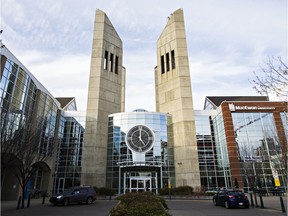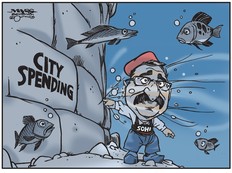Cuts leave MacEwan University $17-million short in current fiscal year: school president

Article content
Edmonton’s MacEwan University faces a $17-million hole in its budget for the 2019–20 fiscal year, according to figures discussed by school administrators Thursday.
In the meeting, MacEwan acting president John McGrath outlined the “unprecedented challenge” faced by the institution in the aftermath of the province’s 2019 budget, which included a five per cent cut to current post-secondary spending. That cut will result in job losses, McGrath indicated.
“It’s certainly the largest in-year reduction to the budget I have seen,” he said. “With these levels of reductions to our funding, we will have to reduce our staff levels. There is simply no way to meet these targets. You don’t lose this level of revenue and sustain your operating budget. It’s simply not possible.”
When reached for statement Friday, the university said it’s not yet known exactly how many positions will be affected.
“The impacts on staff have not yet been determined. We have some very difficult decisions to make,” read an emailed statement from the university. “We know that with these levels of reductions, there are simply not enough non-salary savings or revenue growth opportunities available for us to balance the 2019–20 and 2020–21 budgets without a reduction in positions.”
Budget cuts included a 7.9 per cent reduction to MacEwan’s provincial Campus Alberta grant, tied with Bow Valley College for the largest proportion of funding cut from any institution in the province.
For MacEwan, the grant cut equates to a $9.1-million loss. The school also lost the entirety of its $3-million Infrastructure Maintenance Program grant.
But McGrath said the cuts are actually worse than they initially appear because they apply retroactively to the school’s 2019–20 budget. Accounting for the fact that MacEwan has a fiscal year of July 1 to June 30 as opposed to the province’s fiscal year of April 1 to March 31, as well as the administration’s expectation of a further cut to the grant of 6.5 per cent effective April 1, 2020, McGrath says the school has until June to make up a $17-million shortfall.
Under the Post-Secondary Learning Act, institutions may not submit a deficit budget to the province, meaning that MacEwan has a short period of time to find savings equivalent to about seven per cent of its $253-million budget.
“We have to fit 15 months of cuts into eight months or less, because we have to balance the budget,” McGrath said. “We have to do this by June 30 of 2020, the end of our fiscal year. Essentially, since April of 2019, when you consider the retroactive nature of the reduction, we’ve been spending money we don’t have.”
At government request, cuts will largely focus in what McGrath describes as the “somewhat ill-defined” area of administrative spending. When asked about specifics cuts, McGrath mentioned areas of financial management, advising, technology support and administrative support. He said the school would leave vacancies unfilled and reduce staff levels through attrition and the school would prioritize keeping tenured faculty. McGrath also didn’t rule out voluntary buyouts for tenured faculty.
Beyond that, for cutting expenses, McGrath said “there’s not a lot on the non-salary side” the school can do.
For raising revenues, the school plans to look at enrolment rates and tuition. When asked at the end of the meeting about whether he would commit to not raising tuition by the maximum seven per cent rate allowed, McGrath said he wouldn’t rule anything else until the university had a clearer idea of tuition framework and internal finances.
Cuts to grants were made based on institutions’ abilities to absorb the financial hit, based in part on their average budget surpluses over the last five years.
“We looked at institutions’ annual operating surplus over the past five years and their ability to fare,” said Laurie Chandler, press secretary to advanced education minister Demetrios Nicolaides, on Friday.
But McGrath flagged the selling of satellite campuses in recent years as “artificially increas(ing)” the average surpluses posted by the school, overstating its financial capacity.
“Unfortunately for us, frankly, our surpluses included … two years where we reported the gain of sales of campuses,” noting that the sale of the university’s west satellite campus netted $27 million. “So I’m not thrilled with the outcome.”
The Students’ Association of MacEwan University announced Friday their plans to lead a march from campus to the Alberta legislature on Nov. 18 in protest of the budget’s cost increases to students, including potential tuition hikes and increased interest rates on student loans.
The budget reductions didn’t come as a complete surprise to school administrators, but the fact that they applied retroactively did.
“We were expecting reductions, but were not anticipating this major shift in government policy: the government has taken a differential approach to grant reductions for the sector,” read the school’s statement. “We were anticipating in-year reductions, but not retroactive reductions.”





Postmedia is committed to maintaining a lively but civil forum for discussion. Please keep comments relevant and respectful. Comments may take up to an hour to appear on the site. You will receive an email if there is a reply to your comment, an update to a thread you follow or if a user you follow comments. Visit our Community Guidelines for more information.